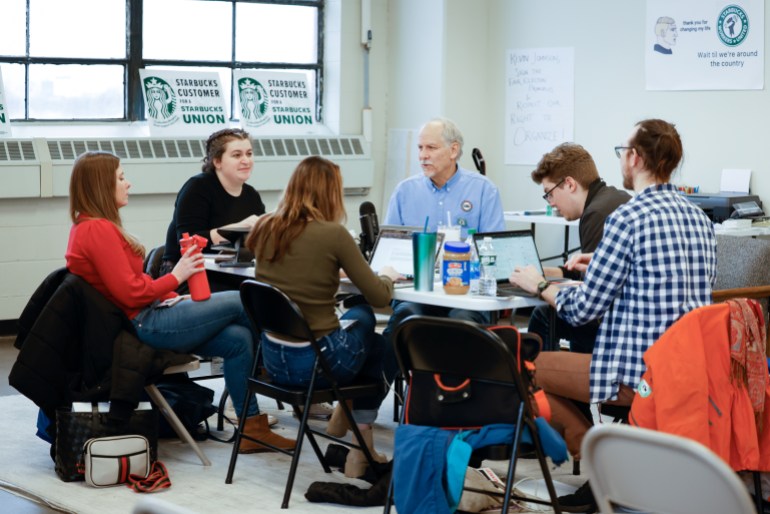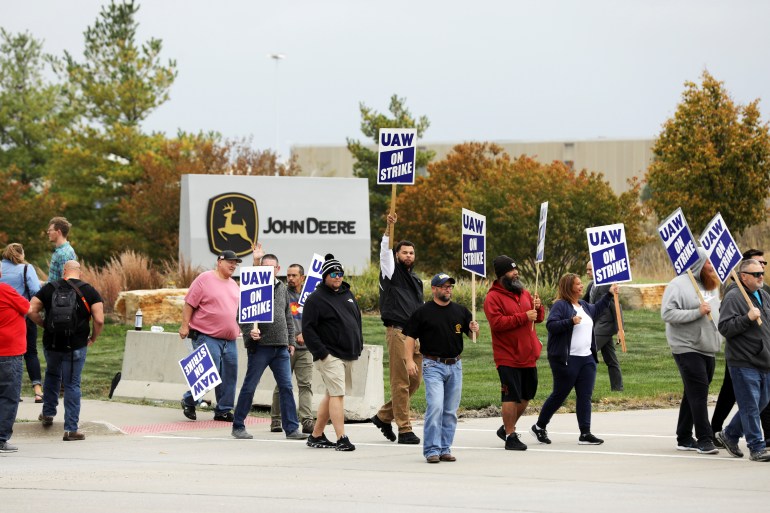Starbucks union vote is latest test of resurgent US worker power
Workers at three Starbucks stores in Buffalo, New York in the United States cast ballots on whether to unionise, with the vote count scheduled for Thursday.

On a cloudy December Wednesday in Buffalo — a small city in New York State situated on the Canadian border just 32km (20 miles) from Niagara Falls — six workers from three Starbucks stores in the area convened in a nondescript red brick building. They stood in front of a wall plastered with a constellation of handwritten posters underneath a black banner that contained two images of a raised fist clenching a drink shaker and that read “partners becoming partners” in bold, white type.
The three stores they represent are looking to become the first Starbucks stores to unionise of the over 8,000 corporate-owned locations in the United States. The outcome of their efforts will be determined when employee votes are counted on Thursday, December 9.
Keep reading
list of 4 itemsTrapped, abandoned: Filipino workers lured to Poland by shadowy agents
EU countries endorse diluted draft rules on gig economy workers’ rights
On 40th anniversary of UK miners’ strike, can Labour win back the north?
The workers announced their intention to unionise in late August, claiming they had not received adequate hazard pay during the coronavirus pandemic and had experienced a steady decline in their working conditions over the last decade.
“We’ve had very little support in terms of what the company was handing down to us to keep us safe [during the pandemic],” said Michelle Eison, a barista and member of the Starbucks Workers United Organizing Committee.
“I’ve been with the company for over a decade, and I make about $1.20 an hour more than someone who was hired yesterday,” she said during a recent press conference. “In spite of all of that, it’s a company that I’m still very proud to be with. I’d like to bring them back to where they were when I started with them 10 years ago.”
For Eisen, that means giving front-line workers like her a say over company policy through the power of collective bargaining.
“The only way to have a say is to have a union negotiate a contract,” she said.

Jaz Brisak is also a member of the organising committee. Like Eisen, she is confident that the union will prevail on Thursday, but laments the roadblocks they’ve faced to get to this point.
Starbucks had asked the National Labor Relations Board (NLRB) to stop Thursday’s ballot count on the grounds that the vote should be extended to all Starbucks locations in Buffalo. The NLRB on Tuesday rejected the appeal, paving the way for the count to go forward.
“We shouldn’t have had to go through all of these obstacles, all of this union-busting that’s continuing up until the last possible second of getting our votes in,” Brisak said of the December 8 voting deadline. “We shouldn’t have to be intimidated in our own stores.”
She claims that Rossann Williams, president of Starbucks North America, and other store managers and executives have been padding eligible union voter lists, conducting anti-union listening sessions, and telling workers that their benefits will disappear should their unionising efforts be successful.
“Rossann Williams was in our stores on Thanksgiving doing all of this union-busting in a turkey hat, like she can fit in by pretending to be festive while really coming in to create a kind of hostile environment,” Brisak said.
Casey Moore, another member of the organising committee, told Al Jazeera that the support they’ve garnered from prominent progressive political figures Senator Bernie Sanders and Congresswoman Alexandria Ocasio-Cortez has been exciting and encouraging.

“He committed to supporting us as we try to get Starbucks to the negotiating table,” Moore said of a call the group had with Sanders.
Starbucks says it has not unlawfully interfered with its workers’ legal right to engage in union-organising efforts.
“We categorically deny these claims,” Starbucks Director of Corporate Communications Reggie Borges said in an email to Al Jazeera.
Borges said allegations that Starbucks failed to give workers adequate hazard pay during the pandemic are “not accurate”, noting that the company “made three different wage investments in the last two years” bringing the average barista’s wage to $17 an hour.
“Compensation for tenured partners has been a consistent part of our company’s history,” Borges added.
A union-friendly climate
Organised labour has fallen far from its heyday in 1954, when nearly 35 percent of workers in the US belonged to a union.
By 2018, the unionisation rate stood at only 10.5 percent. But that number has ticked up slightly during the pandemic, hitting 10.8 percent last year, according to the US Bureau of Labor Statistics.
This year, labour market conditions have turned decidedly in favour of workers, as employers scramble to fill a near-record number of job openings by offering better pay and benefits.
The political climate in Washington has also arguably not been this worker-friendly in decades, thanks to President Joe Biden making “good-paying union jobs” a pillar of his Build Back Better economic policies.
The Cornell University Labor Action Tracker has identified more than 340 strikes in the US this year.
Some of those have involved the nation’s blue-chip firms. From mid-October through mid-November, workers at Deere & Co went on strike before ultimately securing a better contract deal from management.

Even the threat of strike action has made headlines. In November, healthcare giant Kaiser Permanente narrowly avoided a strike by agreeing to scrap a proposal for a cost-cutting two-tiered wage system.
But more strikes do not mean there’s been a strong surge in new union formation.
“It would be wrong to say there’s been a resurgence in organising,” explains Kate Bronfenbrenner, director of labour education research at Cornell University’s School of Industrial and Labor Relations. “But there has definitely been an increase in strike activity.”
This year has also seen some high-profile union defeats.
Workers at an Amazon warehouse in Bessemer, Alabama voted in April not to form a union. But they were granted a rare second vote last month after the NLRB concluded that Amazon had interfered with organising efforts.
And some efforts have been dragging on for months. Workers at four Kellogg’s plants have been striking since early October. Kellogg’s said it would start hiring permanent replacements after a majority of workers voted against the latest contract offer,
Benefits and drawbacks
Union membership has long been attractive to workers with its promise of better wages and job security.
Union members’ wages are more than 11 percent higher on average than those of their non-unionised peers, according to a study by the progressive think-tank the Economic Policy Institute.
And the benefits extend beyond individual workers, said Bronfenbrenner. “The upsides of stronger unions are a more democratic society,” she said. “When you have stronger unions, you have less inequality in society. You have less discrimination. You have less corporate abuse of power.”
Bronfenbrenner added that the only downsides are “for those who are making money at the expense of working people in this country”.
But some economists strongly disagree, saying that union contracts can feed inflation for US consumers, and even leave workers worse off.
“In the private sector, if you have a union … consumers may end up being the ones footing the bill in the form of higher prices,” said Veronique de Rugy, an economist and senior research fellow at the libertarian think-tank Mercatus Center at George Mason University.
“Often, private-sector unions end up raising the labour cost in ways that may end up being detrimental to workers,” de Rugy told Al Jazeera, noting that payment of union fees can be a condition of employment, while firms may simply decide to outsource jobs overseas or, like Boeing did last year, move jobs from union-friendly states to less union-friendly ones.
“The thing that’s best for employees, especially lower-wage employees, is a vibrant economy,” she said.